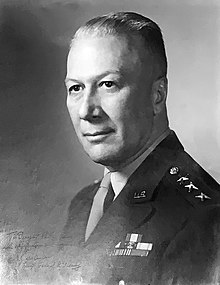
Back لويد فردندال Arabic Lloyd Fredendall Catalan Lloyd Fredendall Danish Lloyd Fredendall German Lloyd Fredendall Spanish Lloyd Fredendall French לויד פרדנדאל HE Lloyd Fredendall Italian 로이드 프레덴덜 Korean Lloyd Fredendall NB
Lloyd Fredendall | |
|---|---|
 Fredendall as Lieutenant General | |
| Born | December 28, 1883 Cheyenne, Wyoming Territory, U.S. |
| Died | October 4, 1963 (aged 79) San Diego, California, U.S. |
| Buried | |
| Allegiance | |
| Service | |
| Years of service | 1907–1946 |
| Rank | |
| Service number | 0-2197 |
| Unit | |
| Commands | 57th Infantry Regiment 4th Infantry Division XI Corps II Corps Second Army Central Defense Command |
| Battles / wars | Philippine–American War World War I World War II |
| Awards | Army Distinguished Service Medal Philippine Campaign Medal Mexican Border Service Medal World War I Victory Medal American Defense Service Medal American Campaign Medal European–African–Middle Eastern Campaign Medal World War II Victory Medal |
| Spouse(s) | Crystal Daphne Chant (m. 1909-1963, his death) |
| Children | 2 |
Lieutenant General Lloyd Ralston Fredendall (December 28, 1883 – October 4, 1963) was a general officer of the United States Army who served during World War II. He is best known for his leadership failure during the Battle of Kasserine Pass, leading to one of America's worst defeats of World War II, for which he was relieved of his command.[1]
He was in command of the Central Task Force landings during Operation Torch in North Africa, and led II Corps during the early stages of the Tunisian Campaign.
In February 1943, while in command of the II Corps, his forces were defeated by German forces commanded by Field Marshal Erwin Rommel and General Hans-Jürgen von Arnim in the Battle of Kasserine Pass. After this debacle, Fredendall was relieved of command of II Corps by General Dwight D. Eisenhower, the Supreme Allied Commander in North Africa, and replaced by Major General George S. Patton.
In spite of being relieved of command, Fredendall was promoted to lieutenant general in June 1943, assumed command of Second Army and was greeted in the United States as a hero.[2]
- ^ Brimelow, Benjamin (February 22, 2022). "What the US's first humiliating encounter with the Nazis taught the Allies about how to win World War II". Business Insider. New York, NY.
Decades after the battle, Gen. Omar Bradley described it as a "complete disaster." "Even these many years later, it pains me to reflect on that disaster," Bradley said in an autobiography published in the 1980s. "It was probably the worst performance of U.S. Army troops in their whole proud history."
- ^ Fitzgerald, Clare (September 17, 2021). "Lloyd Fredendall: One of the Most Unsuccessful American Generals of WWII". War History Online. Alexandria, VA.